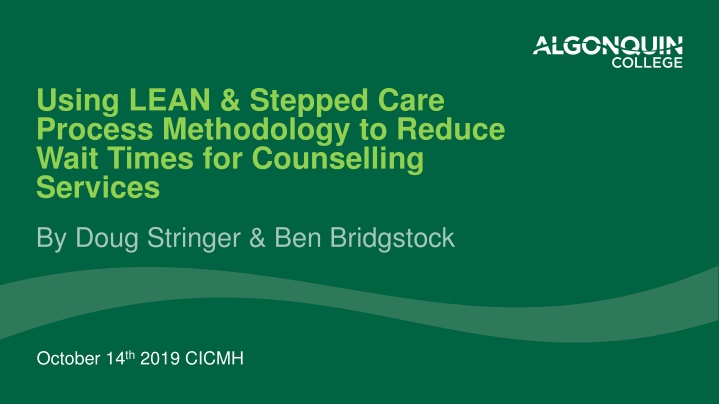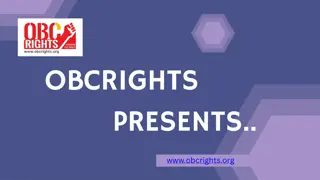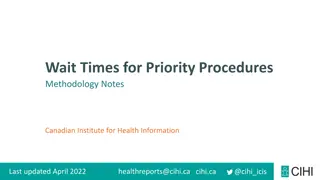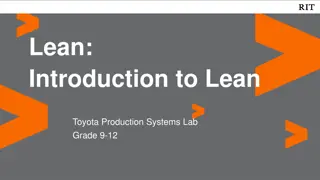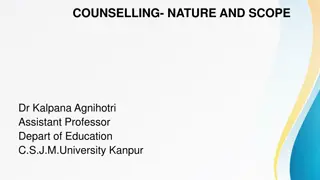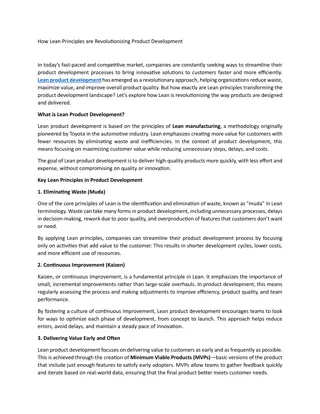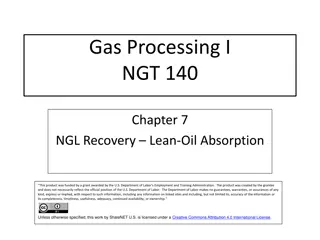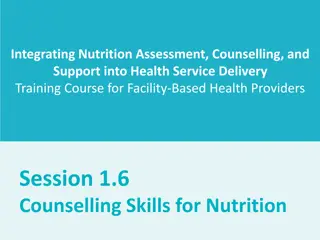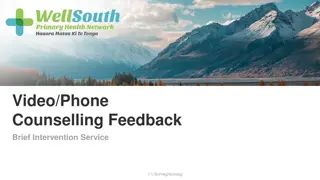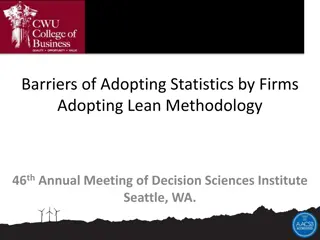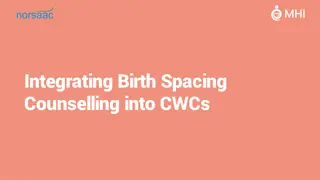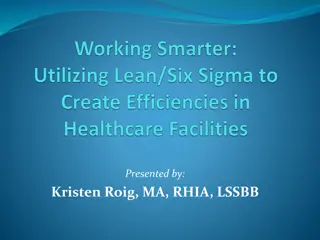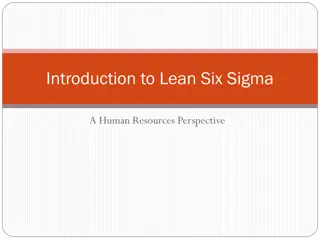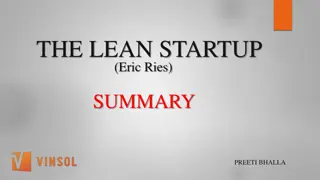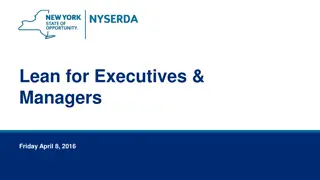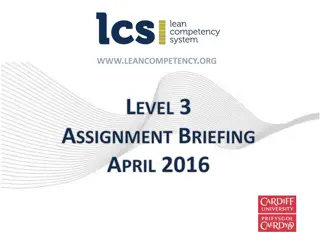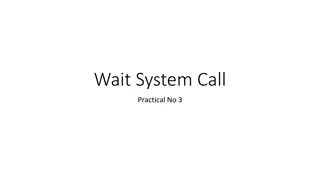Using LEAN & Stepped Care Process Methodology to Reduce Wait Times for Counselling Service
This presentation discusses the successful implementation of Lean and Stepped Care methodologies to reduce wait times for counseling services. The case study presented outlines the journey from identifying the problem to implementing solutions and measuring outcomes. By focusing on Lean values and adopting a Stepped Care approach, the team made significant improvements in service delivery and wait times.
Download Presentation

Please find below an Image/Link to download the presentation.
The content on the website is provided AS IS for your information and personal use only. It may not be sold, licensed, or shared on other websites without obtaining consent from the author.If you encounter any issues during the download, it is possible that the publisher has removed the file from their server.
You are allowed to download the files provided on this website for personal or commercial use, subject to the condition that they are used lawfully. All files are the property of their respective owners.
The content on the website is provided AS IS for your information and personal use only. It may not be sold, licensed, or shared on other websites without obtaining consent from the author.
E N D
Presentation Transcript
Using LEAN & Stepped Care Process Methodology to Reduce Wait Times for Counselling Services By Doug Stringer & Ben Bridgstock October 14th2019 CICMH
Agenda 1. 2. 3. 4. Introductions What you will and won t get from this presentation What is a Lean Approach? The Story What was the Problem? The Change Process The Current State Questions and Discussion 5.
Introductions Doug Stringer; Manager, Counselling Services & Spiritual Centre Ben Bridgstock Director, Student Support Services
What You Will Get From This Presentation 1. Longitudinal case-study of the implementation of Lean and Stepped Care 2. Time line of adjustments with Primary concern at each point Implemented solution Outcome 3. Data illustrating the impact of each change on key performance indicators
What You Wont Get From This Presentation You Won t Get 1. Instructions for implementing Lean or Stepped Care 2. A set of global ingredients for reducing wait times 3. A guide for managing change with a team of clinical professionals
What Are Lean Values? Respect every individual listen to all, empower all, encourage all, serve all Lead with humility leaders ask questions, listen and take a one down view Seek perfection find root causes/solutions, chase flawless service delivery Ensure quality at the source seek to eliminate errors and mistakes Scientific thinking follow plan-do-study-act process rigorously Focus on process results flow from processes, adjust one, impact the other Think systemically every aspect of the system must add value to the end user Create constancy of purpose remove all non value creating steps in process Transparency through visual management display data, act to address data
The Journey from 2008 to Present 10000 9000 8000 7000 6000 5000 4000 3000 2000 1000 0 2008-2009 2010-2011 2011-2012 2012-2013 2013-2014 2014-2015 2015-2016 2016-2017 2017-2018 2018-2019 08-09 10-11 11-12 12-13 13-14 14-15 15-16 16-17 17-18 18-19 Demand for Appointments Appointments Completed Students Served No Appointment Available No-Show Appointments Counselling Group Attendees
The Story: 2008/09 The Manager of Counselling Services noticed Students asked to wait several weeks for appointments. Counsellors without students in their offices much of the time. Appointment scheduling system could not produce reports to capture KPI s: # of appointments available # of appointments used Wait time for appointments # of students being served
The Story: 2008/09 The Manager asked for help from Chuck Doyle, Lean Specialist, he found: Wait time of 3+ weeks No-show rate of 30% - 40% Counsellors completed an average of 2.4 sessions/day Remaining time a mix of no-shows and workshops. No triage for students in acute distress Multiple follow-up sessions booked for clients up to 10 weeks
The Story: 2008/09 Initiated Lean process review Spring, 2009: Value Stream Analysis completed to track path of students Kaizen event with part of Counselling team to address KPI issues Chuck recommended moving to a Walk-In only access model.
The Story: 2009/10 However Limited consensus between Manager and Counselling Team Manager mandated changes to appointment scheduling process: 3 Same-Day Appointments 3 Pre-Booked Follow-Up Appointments Limit of 2 week pre-booking No data compiled for this period.
The Story: 2010/11 Intake process implemented 1 hour intake sessions Focused on triage and balancing case-load Used 2 counsellor positions Assigned delivery of workshops to single PT Counsellor Capped session limit at 6 per student Exceptions permitted following case review with Manager Created method for tracking Service Volume KPI s Including Demand for Appointments
The Story: 2010/11 9000 8000 7000 6000 5000 4000 3000 2000 1000 0 2008-2009 2010-2011 Demand for Appointments Appointment No-Show Appointments Completed No Appointments Available Students Served
The Story: 2011/12 Jeff Agate becomes Manager, Counselling Services Discontinued Intake process Adjusted ratio of Same-Day : Follow-Up appointments to meet changing demand across academic year Created new type of Same-Day appointment Urgent Coverage of Urgent appointments across Counselling schedule Each counsellor assigned 4 Urgent appointments per week Capped daily session limit at 5 Identified peak periods of demand for appointments Scheduled meetings during non-peak periods Staggered counsellor lunches to ensure coverage through mid-day
The Story: 2011/12 9000 8000 7000 6000 5000 4000 3000 2000 1000 0 2008-2009 2010-2011 2011-2012 Demand for Appointments Appointments Completed Students Served Appointment No-Show No Appointments Available
The Story: 2012/13 Moved to new Student Commons services space Increased promotion of Counselling Extended service hours from 8:45-4:45 to 8:00-6:00 One-Stop shared reception desk Drafted clear guidelines for appointment booking Re-Launched Intake process. 3 PT non-counsellor mental health workers added 30 minute sessions 110 Intake sessions available each week Completed counselling-admin tasks and basic referrals
The Story: 2012/13 9000 8000 7000 6000 5000 4000 3000 2000 1000 0 2008-2009 2010-2011 2011-2012 2012-2013 Demand for Appointments Appointments Completed Students Served Appointment No-Show No Appointments Available
The Story: 2013/14 Implemented Urgent Counsellor role Experienced crisis counsellor Single-session model Increasing awareness and de-stigmatization of mental health Continued increase in demand for Counselling Provided feedback to individual counsellors based on KPI Data # Unique students seen (Case Load) # Appointments completed Mean # Appointments per student % Appointment no-show rate
The Story: 2013/14 9000 8000 7000 6000 5000 4000 3000 2000 1000 0 2008-2009 2010-2011 2011-2012 2012-2013 2013-2014 Demand for Appointments Appointments Completed Students Served Appointment No-Show No Appointments Available
The Story: 2014/15 Solidifying of changes made to date Increasingly detailed measurement of Counselling KPI s Enhanced relationship with Residence Life team Training of Residence staff team Increased promotion of Counselling Services Priority referral procedure
The Story: 2014/15 9000 8000 7000 6000 5000 4000 3000 2000 1000 0 2008-2009 2010-2011 2011-2012 2012-2013 2013-2014 2014-2015 Demand for Appointments Appointments Completed Students Served Appointment No-Show No Appointments Available
The Story: 2015-16 Ben Bridgstock becomes Manager, Counselling Services Umbrella Project Substance Use Harm-Reduction Project Increased awareness of substance use issues across college Training delivered to counselling team Addiction Counsellor available for consultations Student satisfaction survey initiative Identifying most valued aspects of Counselling Services Included feedback on difficulty acquiring appointments
The Story: 2015/16 9000 8000 7000 6000 5000 4000 3000 2000 1000 0 2008-2009 2010-2011 2011-2012 2012-2013 2013-2014 2014-2015 2015-2016 2016-2017 Demand for Appointments Appointments Completed Students Served Appointment No-Show No Appointments Available
The Story: 2016-17 Student feedback centered on access, wait time experienced before meeting a counsellor and availability of counsellors to meet with them on a regular basis Guest speakers/trainers invited to share ideas about service delivery to the Counselling team, including; Coordinator of the walk in clinic at Family Services Ottawa, Dr. Peter Cornish, Memorial University Dr. Jennifer Thake professor & lead clinician at Terrace Wellness Dr. Simon Hatcher, a Psychiatrist at the Ottawa Hospital
The Story: 2016-17 9000 8000 7000 6000 5000 4000 3000 2000 1000 0 2008-2009 2010-2011 2011-2012 2012-2013 2013-2014 2014-2015 2015-2016 2016-2017 Demand for Appointments Appointments Completed Students Served Appointment No-Show No Appointments Available
The Story: 2017-18 Preparations for Stepped Care model of service delivery: Hired a counsellor to run groups Counsellors trained in single-session in preparation for walk-in Counsellors involved in planning and preparation of service model change Instituted BHM 20 for feedback-informed service for all students who come with a mental health concern Initiate use of Therapy Assisted Online (TAO)
The Story: 2017-18 10000 9000 8000 7000 6000 5000 4000 3000 2000 1000 0 08-09 10-11 11-12 12-13 13-14 14-15 15-16 16-17 17-18 Demand for Appointments Appointments Completed Students Served No Appointment Available No-Show Appointments
The Story: 2018-19 Doug Stringer becomes Manager, Counselling Services Intake process removed in favour of daily walk-in access to Counselling Services as the entry point Once a student has accessed a counsellor, subsequent appointments can be scheduled
The Statistics: 2018-19 Over the 18/19 academic year 77% of students who came were seen that day , either through Walk-in or Urgent appointments In 2017-2018 there were 1672 Intake appointments and 3205 Counsellor appointments In 2018-2019 there were 0 Intake appointments and 3992 Counsellor appointments
The Statistics: 2018-19 Even with the removal of all Intake appointments, total unique students served increased from 2799 to 2942 1041 students attended groups and events run by our groups counsellor
The Statistics: 2018-19 In April 2018, 90% of Students stated that they would recommend Counselling Services to a friend (down 6 % from the previous year.) In April 2019, 98% of students surveyed indicated they would recommend Counselling Services to a friend In April 2018, 83% of students said they came away from counseling with a good plan to address their issues (down 8 % from the previous year) In April 2019, 95% of students said they came away from counseling with a good plan to address their issues In April 2018, 54% of students felt they were able to meet with their counsellor as often as they would like (down 18 % from the previous year) In April 2019, 95% of students stated they believe Counselling Services is available when they need support In April of 2018, 35% of student comments expressed concerns about access, scheduling and wait times between appointments In April of 2019, 21% of student comments expressed these same concerns
The Story: 2018-19 10000 9000 8000 7000 6000 5000 4000 3000 2000 1000 0 2008-2009 2010-2011 2011-2012 2012-2013 2013-2014 2014-2015 2015-2016 2016-2017 2017-2018 2018-2019 08-09 10-11 11-12 12-13 13-14 14-15 15-16 16-17 17-18 18-19 Demand for Appointments Appointments Completed Students Served No Appointment Available No-Show Appointments Counselling Group Attendees
Thank You! Any Questions?
